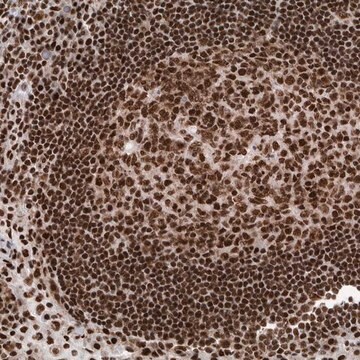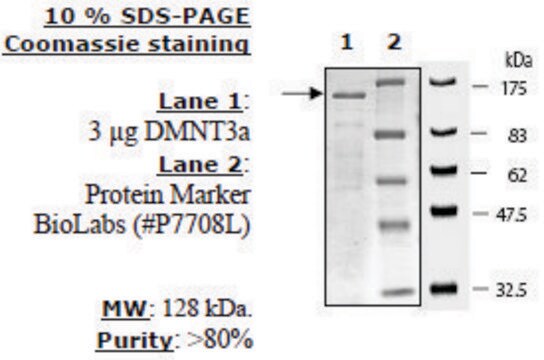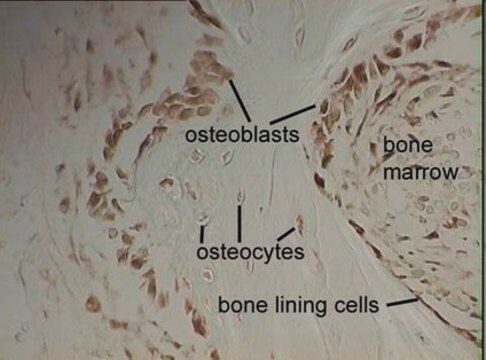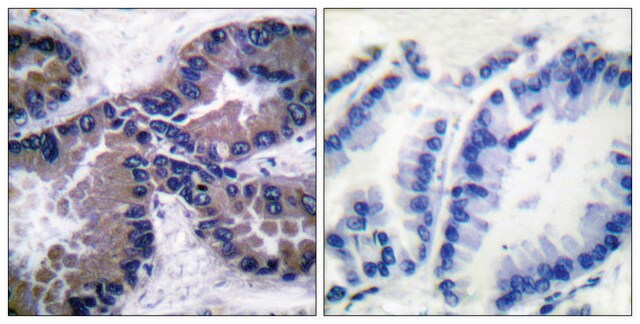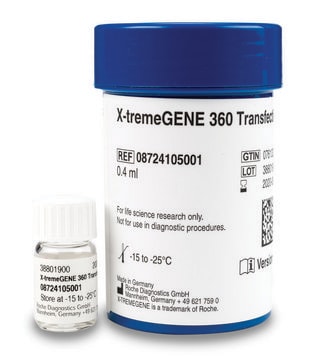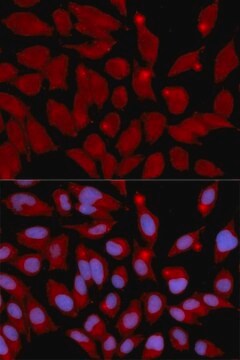SRP0396
DNMT3A/DNMT3L active human
recombinant, expressed in baculovirus infected Sf9 cells, ≥90% (SDS-PAGE)
Sign Into View Organizational & Contract Pricing
All Photos(2)
About This Item
UNSPSC Code:
12352200
NACRES:
NA.32
Recommended Products
biological source
human
recombinant
expressed in baculovirus infected Sf9 cells
Assay
≥90% (SDS-PAGE)
form
aqueous solution
mol wt
34 kDa (MLL1)
52 kDa (DNMT3L)
packaging
pkg of 10 μg
NCBI accession no.
UniProt accession no.
shipped in
dry ice
storage temp.
−70°C
Gene Information
human ... DNMT3A(1788) , DNMT3L(29947)
General description
The DNMT3A (DNA (cytosine-5)-methyltransferase 3A) gene is mapped to human chromosome 2p23. The encoded protein has 2 isoforms, DNMT3A1 and DNMT3A2. DNMT3A1 is widely expressed and DNMT3A2 is mainly present in embryonic stem cells (ovaries and testes).
DNMT3L (DNA (cytosine-5)-methyltransferase 3-like) belongs to the Dnmt3 family. It is unable to methylate DNA. The protein has a cysteine-rich region containing a novel-type zinc finger domain. The gene is mapped to human chromosome 21q22.3.
DNMT3L (DNA (cytosine-5)-methyltransferase 3-like) belongs to the Dnmt3 family. It is unable to methylate DNA. The protein has a cysteine-rich region containing a novel-type zinc finger domain. The gene is mapped to human chromosome 21q22.3.
Application
DNMT3A/DNMT3L active human has been used in in vitro methylation assay and REMSA (RNA electrophoretic mobility shift assay) to study role of ecRNAs (extra coding RNAs) in DNA methylation.
Biochem/physiol Actions
DNMT3A (DNA (cytosine-5)-methyltransferase 3A) is a DNA methyltransferase. It is responsible for the methylation of the cytosine residue in 5′-C-phosphate-G-3′ (CpG) dinucleotides. DNMT3A plays a significant role in immunoregulation (adaptive as well as innate immune responses). It is also the most commonly mutated gene in hematologic malignancies. DNMT3A is a commonly mutated gene in acute myeloid leukemia and is responsible for an unfavorable prognosis.
DNMT3L (DNA (cytosine-5)-methyltransferase 3-like) is mainly responsible for the stimulation of DNA methylation. It is a non-catalytic accessory factor. It helps the DNA methylation machinery to be placed on properly chromatinized DNA regions. It also helps the poorly methylated area, thereby providing uniform methylation patterns. Mutations in the DNMT3L gene might be associated with azoospermia susceptibility.
DNMT3L (DNA (cytosine-5)-methyltransferase 3-like) is mainly responsible for the stimulation of DNA methylation. It is a non-catalytic accessory factor. It helps the DNA methylation machinery to be placed on properly chromatinized DNA regions. It also helps the poorly methylated area, thereby providing uniform methylation patterns. Mutations in the DNMT3L gene might be associated with azoospermia susceptibility.
Storage Class Code
10 - Combustible liquids
WGK
WGK 1
Flash Point(F)
Not applicable
Flash Point(C)
Not applicable
Certificates of Analysis (COA)
Search for Certificates of Analysis (COA) by entering the products Lot/Batch Number. Lot and Batch Numbers can be found on a product’s label following the words ‘Lot’ or ‘Batch’.
Already Own This Product?
Find documentation for the products that you have recently purchased in the Document Library.
DNMT3A Haploinsufficiency Transforms FLT3ITD Myeloproliferative Disease into a Rapid, Spontaneous, and Fully Penetrant Acute Myeloid Leukemia.
Meyer SE
Cancer Discovery, 6, 501-501 (2016)
DNMT3A Loss Drives Enhancer Hypomethylation in FLT3-ITD-Associated Leukemias.
Yang L, et al.
Cancer Cell, 29, 922-922 (2016)
The CpG island encompassing the promoter and first exon of human DNMT3L gene is a PcG/TrX response element (PRE).
Basu A, et al.
PLoS ONE, 9, e93561-e93561 (2014)
Association between single-nucleotide polymorphisms of DNMT3L and infertility with azoospermia in Chinese men.
Huang JX, et al.
Reproductive Biomedicine Online, 24, 66-66 (2012)
Isolation and initial characterization of a novel zinc finger gene, DNMT3L, on 21q22.3, related to the cytosine-5-methyltransferase 3 gene family.
Aapola U, et al.
Genomics, 65, 293-293 (2000)
Our team of scientists has experience in all areas of research including Life Science, Material Science, Chemical Synthesis, Chromatography, Analytical and many others.
Contact Technical Service